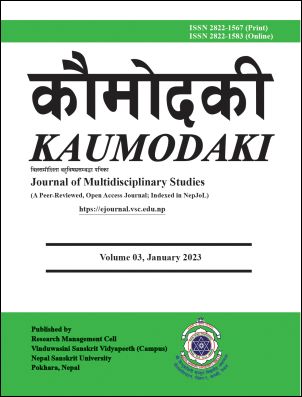Poetry Teaching as a Therapy: A Psychological Approach
DOI:
https://doi.org/10.3126/kdk.v3i1.52093Keywords:
Creation, defense mechanisms, empathy, psychotherapy, reflectionAbstract
Teaching poetry is a major part of teaching literature. It can be done adopting a variety of approaches. The most effective approach is the one which helps students anticipate the content and structure of the poem. Poetry as a therapy approach focuses on the psychological aspect of the students. The foundation of this approach is rooted in the psychological theories of Freud and Jung. As a psychological approach to teaching poetry, the therapeutic approach focuses on the psychological development of the student, beginning from finding out the supportive elements in the poem as the mode of empathy and experimenting, action and application, and creative mode of reading poetry in the classroom. This study explicates some of the typical modes and methods of teaching poetry psychologically and how these stages are interlinked for the overall development of students’ creativity in learning poetry and creating poetry of their own to reveal their pains, feelings, experiences, and anxieties and transform their negative feelings into creative production. Being an analytical research work, this paper observes theoretical foundation of psychological approach of teaching poetry and establishes basic conceptual framework on how it can be applicable in poetry classroom.
Downloads
Downloads
Published
How to Cite
Issue
Section
License
This license enables reusers to distribute, remix, adapt, and build upon the material in any medium or format for noncommercial purposes only, and only so long as attribution is given to the creator.




